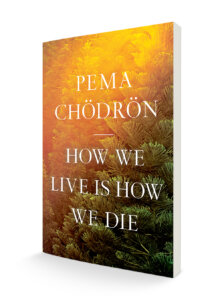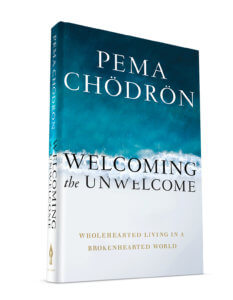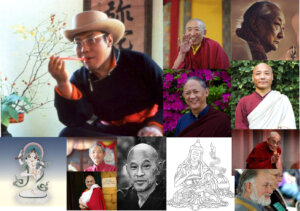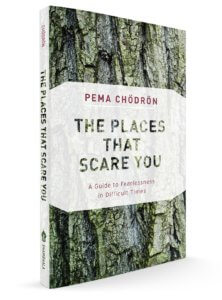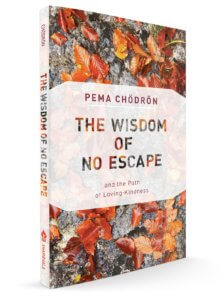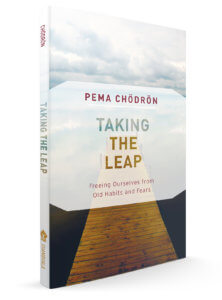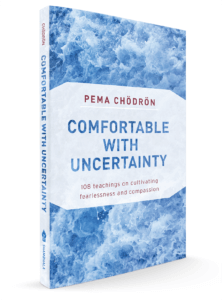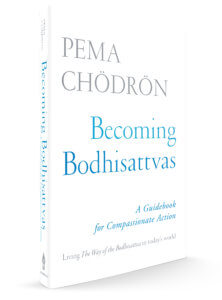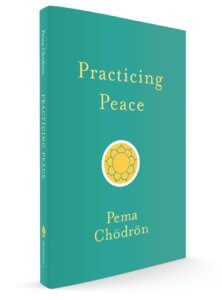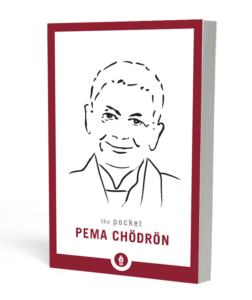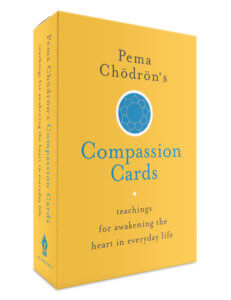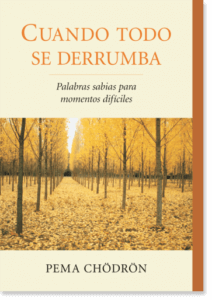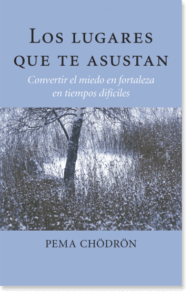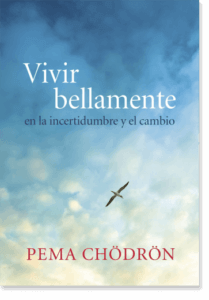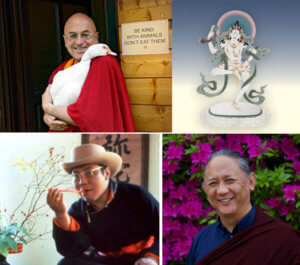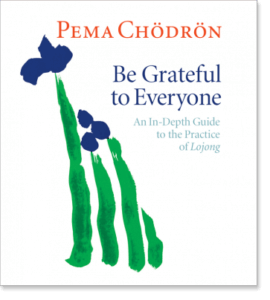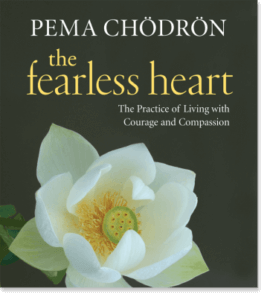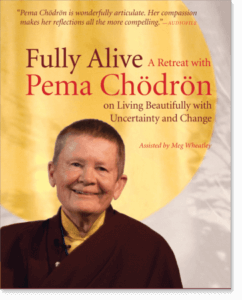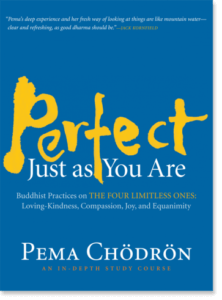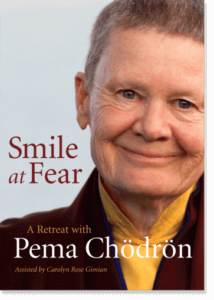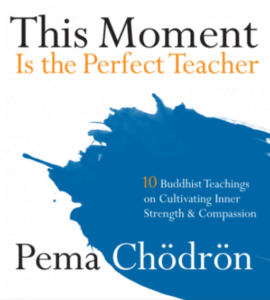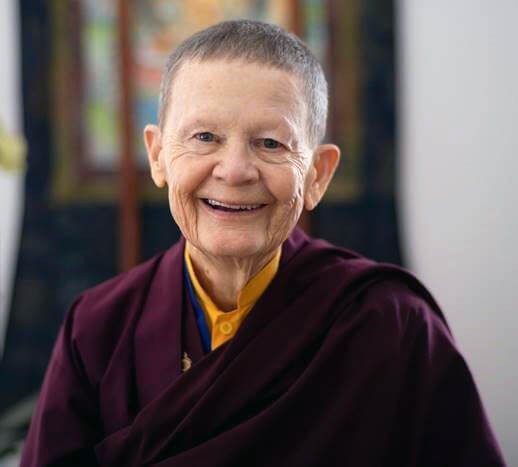
About Pema Chödrön
Ani Pema Chödrön was born Deirdre Blomfield-Brown in 1936, in New York City. She graduated from the University of California at Berkeley and was an elementary school teacher for many years in New Mexico and California.
In her mid-thirties, Ani Pema met and studied with Lama Chime Rinpoche, becoming a novice nun in 1974 in London. She received ordination from His Holiness the Sixteenth Karmapa during that time.
Pema first met her root guru, the teacher with whom she had the most profound connection, Chögyam Trungpa Rinpoche, in 1972, and she studied closely with him until his death in 1987.
In 1984, at the behest of Chögyam Trungpa Rinpoche, Ani Pema moved from Boulder, Colorado to Cape Breton, Nova Scotia to be the director of Gampo Abbey. She currently teaches throughout the United States and Canada and continues her studies and meditative retreat under the guidance of Venerable Dzigar Kongtrul Rinpoche.
The nonprofit Pema Chödrön Foundation was established to further Ani Pema’s interest in helping establish Tibetan Buddhist monasticism in the West as well as to support the continuation of her teachings across traditions.
Jump to: Online Courses | Books | Cards and Journal | Books in Spanish | Audio Programs | Video
Online Course with Pema Chödrön
This is an immersive course in the intimate setting of Gampo Abbey where she shares with us truly transformative teachings. Students in this course will have 14 hours of video teachings which are integrated with guided reading assignments from selections chosen by Pema, downloadable audio files, and 50% off the recommended reading at Shambhala Publications.
The Heart of the Matter
This self-study course offers a special opportunity to experience Pema Chödrön’s generous heart and deep wisdom. Featuring seven talks filmed in the intimate setting of Gampo Abbey, this is a rare opportunity to study with this extraordinary teacher.
As her theme for the course, Pema uses a short Buddhist text especially close to her heart, Thirty-Seven Practices of a Bodhisattva. This classic text, which could be said to summarize the major themes of Pema’s teachings over the years, presents ways that we can work with our own hearts and minds.
Books by Pema Chodron
As much as we might try to resist, endings happen in every moment—the end of a breath, the end of a day, the end of a relationship, and ultimately the end of life. And accompanying each ending is a beginning, though it may be unclear what the beginning holds. In How We Live Is How We Die, Pema Chödrön shares her wisdom for working with this flow of life—learning to live with ease, joy, and compassion through uncertainty, embracing new beginnings, and ultimately preparing for death with curiosity and openness rather than fear.
Poignant for readers of all ages, her teachings on the bardos—a Tibetan term referring to a state of transition, including what happens between this life and the next—reveal their power and relevance at each moment of our lives. She also offers practical methods for transforming life’s most challenging emotions about change and uncertainty into a path of awakening and love. As she teaches, the more freedom we can find in our hearts and minds as we live this life, the more fearlessly we’ll be able to confront death and what lies beyond. In all, Pema provides readers with a master course in living life fully and compassionately in the shadow of death and change.
Hardcover | Ebook | Paperback |Audiobook
$16.95 - Paperback
In her first new book of spiritual teachings in over seven years, Pema Chödrön offers fresh wisdom, heartfelt reflections, and the signature humor and insight that have made her a beloved guide during turbulent times. In an increasingly polarized world, Pema offers us tools to find common ground, even when we disagree, so we can build a stronger and broader sense of community. Sharing never-before-told personal stories from her remarkable life, simple and powerful everyday practices, and directly relatable advice, Pema leads the way in showing us how to become triumphant bodhisattvas—compassionate beings—in even the most difficult of circumstances.
The audiobook is read by Claire Foy, known for playing Queen Elizabeth in Netflix's The Crown as well as Lisbeth Salander in The Girl Who Played with Fire, and available on Audible.com
Hardcover | Paperback | Ebook
Audiobook | Abridged CD | Abridged Audio download
$18.95 - Paperback
The book of our times. Ani Pema's best-selling book and an American spiritual classic.
How can we live our lives when everything seems to fall apart—when we are continually overcome by fear, anxiety, and pain? The answer, Pema Chödrön suggests, might be just the opposite of what you expect. Here, in her most beloved and acclaimed work, Pema shows that moving toward painful situations and becoming intimate with them can open up our hearts in ways we never before imagined. Drawing from traditional Buddhist wisdom, she offers life-changing tools for transforming suffering and negative patterns into habitual ease and boundless joy.
Hardcover | Paperback | Ebook | Spanish Edition
$16.95 - Paperback
We always have a choice, Pema Chödrön teaches: we can let the circumstances of our lives harden us and make us increasingly resentful and afraid, or we can let them soften us and make us kinder. Amid our difficulties, wisdom is always available to us, but we usually block it with habitual patterns rooted in fear. Beyond that fear lies a state of openheartedness and tenderness. This book teaches us how to awaken our basic goodness and connect with others, to accept ourselves and others completey with faults and imperfections.
Read an excerpt>
Paperback | Ebook | Audiobook | Spanish Edition
$14.95 - Paperback
The teachings she presents here—known as the “Three Commitments”—provide a treasure trove of wisdom for learning to step right into the unknown, to completely and fearlessly embrace the groundlessness of being human. When we do, we begin to see not only how much better it feels to live an openhearted life, but we find that we begin to naturally and more effectively reach out to help and heal all those around us.
An indispensable handbook for cultivating fearlessness and awakening compassion in the midst of daily living. Pema Chödrön frames her teachings on compassion around fifty-nine traditional Tibetan Buddhist maxims such as: “Always apply only a joyful state of mind” and “Always meditate on whatever provokes resentment.”
Read an excerpt>
Paperback | Ebook | Audiobook
$16.95 - Paperback
This book—Ani Pema's first—is about saying yes to life in all of its manifestations and embracing the potent mixture of joy, suffering, brilliance, and confusion that characterizes the human experience.
Pema Chödrön shows us the profound value of our situation of “no escape” from the ups and downs of life.
Read an excerpt>
Paperback | Ebook
$16.95 - Paperback
In this book, Pema Chödrön shows us how to break free of destructive patterns in our lives and experience a new sense of freedom and happiness. Drawing on the Buddhist concept of shenpa, she helps us to see how certain habits of mind tend to “hook” us and get us stuck in states of anger, blame, self-hatred, and addiction. The good news is that once we start to see these patterns, we can begin to change our lives for the better.
Read an excerpt>
Paperback | Ebook | Audio Download
$17.95 - Paperback
This book offers short, stand-alone teachings designed to help us cultivate compassion and awareness amid the challenges of daily living. More than a collection of thoughts for the day, Comfortable with Uncertainty offers a progressive program of spiritual study, leading the reader through essential concepts, themes, and practices on the Buddhist path.
Paperback | Ebook
Audio Download* | CD*
*Audio titled No Time to Lose
$29.95 - Paperback
In this book Pema Chödrön presents the traditional Buddhist teachings that guide her own life: those of The Way of the Bodhisattva (Bodhicharyavatara), a text written by the eighth-century sage Shantideva. This treasured Buddhist work is remarkably relevant for our times, describing the steps we can take to cultivate courage, caring, and joy—the keys to healing ourselves and our troubled world.
Previously published under the title No Time to Lose.
Paperback | Ebook
$12.95 - Paperback
Selected readings from The Wisdom of No Escape, presented in a small pocket-sized edition perfect for carrying along in a purse, briefcase, or coat pocket. A portable book of inspiration on how to remain wholeheartedly awake and use the abundant material of daily life as your primary teacher and guide.
Paperback | Audio Download
$12.95 - Paperback
Here Pema Chödrön shows us how to look deeply at the underlying causes of our tensions and how we really can create a more peaceful world. She draws on Buddhist teachings to explore the origins of anger, aggression, hatred, and war, and offers practical techniques all of us can use to work for genuine, lasting peace in our own lives and in whatever circumstances we find ourselves.
Paperback | Ebook
$17.95 - Paperback
Here Pema Chödrön introduces a powerful, transformative method to nurture compassion using a practice called lojong. This book presents fifty-nine pithy lojong teachings for daily contemplation and includes Pema’s clear, succinct guidance on how to understand them—and how they can enrich our lives. It also features a forty-five minute downloadable audio program entitled “Opening the Heart.”
Paperback | Ebook
$12.95 - Paperback
Here is a treasury of 108 short selections from the bestselling books of Pema Chödrön. Designed for on-the-go inspiration, this collection offers teachings on becoming fearless; breaking free of destructive patterns; developing patience, kindness, and joy amid our everyday struggles; and unlocking our natural warmth, intelligence, and goodness.
Pema Chödrön Interactive Works: Journal and Cards
Paperback Journal
$16.95 - Paperback
This keepsake journal shares thoughtful quotes and offers inviting spaces that await your reflections, insights, and intentions. Find support for challenging times, guidance for uncertainty, and reminders of daily joy. A perfect space for personal reflection and spiritual exploration.
Card Deck
$16.95 - MixedMedia
Let compassion and fearlessness guide you and you’ll live wisely and effectively in good times and bad. Here Pema Chödrön offers a powerful method to awaken these qualities using a practice called lojong, which has been a primary focus of her teachings and personal practice for many years. In this boxed set of 59 cards, she provides all the tools needed to practice it in your own life.
Pema Chödrön Books in Spanish (Shambhala Español)
Paperback | Ebook
$16.95 - Paperback
Sólo hay una manera de encarar el sufrimiento que proporcione beneficio duradero, nos enseña Pema: ir hacia las situaciones dolorosas con cordialidad y curiosidad, relajándonos en la insubstancialidad fundamental de toda nuestra situación. Es ahí, en medio del caos, que podemos descubrir la verdad y el amor que son indestructibles.
Paperback | Ebook
$16.95 - Paperback
Este libro nos enseña a despertar nuestra bondad fundamental y a conectarnos con otros, a aceptarnos nosotros mismos y a los demás íntegramente, con fallas e imperfecciones, y a mantenernos en el momento presente al advertir las estrategias del ego que provocan que nos resistamos a aceptar la vida tal como ésta es.
Paperback | Ebook
$16.95 - Paperback
Las enseñanzas que la autora nos presenta aquí -conocidas como los “Tres Compromisos”— brindan una riqueza de conocimientos para aprender a adentrarse directamente en el río, a acoger plenamente y sin temores el carácter insondable del ser humano.
Free Resources
Tonglen
Tonglen, the Tibetan practice of "giving and taking" is a frequent subject of Ani Pema's talks. Here she gives a brief overview of how to do it…and why!
Pema's Teachers, Inspirations, and Friends
Did you ever wonder where Pema learned to do what she does and who her teachers and inspirations are? Here is a guide to some of them.
Standalone Audio Programs
One of the best ways to bring meditation off the cushion and into everyday life is to practice lojong (or mind training). For centuries, Tibetans have used fifty-nine powerful mind-training slogans as a way to transform life’s ordinary situations into opportunities for awakening. In this audio program, Pema Chödrön presents her definitive audio teachings on lojong. She offers an overview of the practice and goes on to provide inspiring commentary on the slogans while paying special attention to applying them on the spot in our daily lives
Life has a way of provoking us with traffic jams and computer malfunctions, with emotionally distant partners and crying children—and before we know it, we're upset. We feel terrible, and then we end up saying and doing things that only make matters worse. But it doesn't have to be that way, says Pema Chödrön. It is possible to relate constructively to the inevitable shocks, losses, and frustrations of life so that we can find true happiness. The key, Pema explains, is not biting the "hook" of our habitual responses. In this recorded weekend retreat, Pema draws on Buddhist teachings from the classic Buddhist work The Way of the Bodhisattva.
Fear and guilt are two of the greatest challenges we face on the spiritual path—but there is a way to transform these painful feelings into courageous self-acceptance. Here Pema Chödrön presents the five aphorisms for developing fearlessness that were given to Machig Lapdronma, one of Tibetan Buddhism's greatest female teachers. Pema comments on these aphorisms, holds question-and-answer sessions, and leads guided meditations to help us: overcome shame and guilt; remain courageous in the face of pain; transform our relationships with difficult people; increase our feelings of generosity and compassion.
We live in difficult times. Life sometimes seems like a roiling and turbulent river threatening to drown us. Why, in the face of that, shouldn’t we cling for safety to the certainty of the shore—to our comfortably familiar patterns and habits? Because, Pema Chödrön teaches, that kind of fear-based clinging leads only to even greater suffering.
Compassion is a skill. You can learn it here and now, and the benefits are vast. In this recorded retreat, Pema Chödrön shows you how—using a text that is very close to her heart: the Buddhist classic known as The Way of the Bodhisattva. Here she focuses on its primary subject, the enlightened heart and mind (bodhichitta), showing us how this awakened state, which often seems infinitely far out of our grasp, is always available to us right where we are.
Spiritual practice, Pema Chödrön teaches, has nothing to do with self-improvement, since, as the course’s title claims, you’re already perfect right now. The limitless qualities of loving-kindness, compassion, joy, and equanimity are your deep-down, ultimate reality, and those are qualities that can’t be improved upon. If you’re not feeling particularly kind, compassionate, joyful, or equanimous at the moment, take heart: the Four Limitless Ones are there like seeds, waiting to be cultivated through practice—and, being limitless, they’re rich enough to be worked with for a lifetime.
We all have fears, but when we look closely at them, we discover that behind each fear resides a basic fear of ourselves. We’re afraid to look at our habitual styles of thinking and behaving because we might not always like what we see. Ironically it is this fear of honest self-reflection that keeps us trapped in patterns of stress and discontentment. Here is a vision for moving beyond this most basic fear to discover the innate bravery, trust, and joy that reside at the core of our being.
Lojong is a powerful Tibetan Buddhist practice created especially for training the mind to work with the challenges of everyday living. It teaches our hearts to soften, reframes our attitude toward difficulty, and allows us to discover a wellspring of inner strength. In this recorded retreat, Pema Chödrön introduces the lojong teachings and explains how we can apply them to any situation in our life—because, as Pema says, "every moment is an opportunity for awakening."
Video Programs: DVDs and On-Demand Streaming
Compassion is a skill. You can learn it here and now, and the benefits are vast. In this recorded retreat, Pema Chödrön shows you how—using a text that is very close to her heart: the Buddhist classic known as The Way of the Bodhisattva. Here she focuses on its primary subject, the enlightened heart and mind (bodhichitta), showing us how this awakened state, which often seems infinitely far out of our grasp, is always available to us right where we are.
We all have fears, but when we look closely at them, we discover that behind each fear resides a basic fear of ourselves. We’re afraid to look at our habitual styles of thinking and behaving because we might not always like what we see. Ironically it is this fear of honest self-reflection that keeps us trapped in patterns of stress and discontentment. Here is a vision for moving beyond this most basic fear to discover the innate bravery, trust, and joy that reside at the core of our being.



